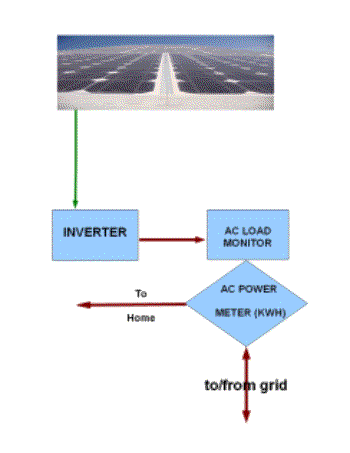- Home
Most PopularWater HeatingHome PowerLiving Off GridEconomical AspectsComponentsSite InformationSpace Heating & CoolingGeneral Interest- Tell your story
|
Residential Solar Electricity
Frequently Asked Questions
With the increased awareness to residential solar electricity systems (residential solar power systems), people are looking for answers to their questions on residential solar systems. I will provide answers to Frequently Asked Questions related to residential solar on:
Solar Technology Background
Cost of Residential Solar Systems
Energy Tax Credits
Financing of Residential Solar Systems
- What is a Residential Solar System?
- A residential solar electricity system produces electricity by directly converting the daylight sun radiation (photons) to electricity (photons). It is based on the Photovoltaic Effect (PV), the generated power is Direct Current (DC) electricity
- What are Solar Electric Panels?
- solar electric panels are in the heart of the residential solar power system, they are also called PV panels, they are the actual “generator” that silently generate clean DC electrical power by harnessing sun radiation. The larger the size of the panels, the more power can be generated.
- What is an inverter?
- Homes use AC electrical power, homes are connected to the utility grid by AC power lines. Most off grid homes (homes not connected to the utility grid) also use AC power because there are a much larger variety of AC appliances available commercially. The inverter converts the DC output of the Solar Panels to the AC power ready for the home electricity needs. utility connected inverters can feed the surplus production back to the grid, while off grid inverters charge back up storage batteries for feeding the home consumption over nights.
- What is the typical size of a system
- Most homes that are connected to the grid install PV systems (panels and inverters) that have production capacity of 2,000 Watts to 4,000 Watts. A 1,000 Watts residential solar electricity system can produce 180 kW-Hour every month, the area depends on the technology. Mono-crystalline Silicon 1,000 Watts panels area is 60 square feet, the area of poly-crystalline panels with same 1,000 Watts output is 130 square feet.

- What is the cost of a typical residential solar system?
- There are three cost items, the equipment cost, the installation cost and the cost of permits. The equipment cost is per Watt production; the larger the system the lower is the cost per Watt production, simply due to the sliding scale volume discount. Equipment cost is $5 to $7 per Watt (2010 prices). Installation and permits can amount to around $3,000 for a 3 kW system. There are a few ways to get cheaper solar systems, such as buying at wholesale prices and DIY. In many states (e.g. California), self installed and/or off grid systems cannot enjoy state and utility Energy Tax Credits
- How much will the system save?
- The system will considerably reduce your electricity bills. A 1,000 Watt system, producing 180 kW-hours monthly (2,160 kW-hours annually) will save you the cost of these 2,160 kW-hours every year. If the price per kW-hour is 30 cents the system will save you $650 every year for its entire 20 years life span. Even better, electricity prices are continuously rising, 5% annually was noticed over the last decade. This means, your saving will increase as years pass
- What are feed in tariffs and what is net metering?
- These terms relate to selling back your surplus electricity during the day to the utility, usually the family is away from home during daylight hours so the household can feed back its surplus production to the grid and to buy electricity when the family is back home during dark hours.
In the US and in many countries, the government subsidizes the upfront investment in residential solar electricity x c systems through tax credits. US energy tax credits start at 30% IRS credit plus state and utility specific rebates. In some states such as in many California counties, although the home value is appraised higher with a solar system installed, the property tax will stay as it was. A good source to find out about tax provisions where you live is your local utility Financing the balance between the gross cost minus the tax credits is an issue many homeowners face. There are long term solar energy loans available in many regions. Another business model is solar lease, a similar concept to car leasing
click to view my home energy Home Page
|
|
|
